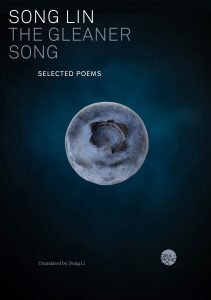Dong Li: a note on The Gleaner Song
I got to know Song Lin well while at Ledig House for a Translation Lab residency. On a long walk in the countryside of Upstate New York, I saw his eyes light up as a deer leapt from the wild into a wide-open field. As the evening hues shifted farther into the forest, his line of sight followed the deer until it vanished into the night. We talked about the deer, and later he asked me to translate a poem that he had written to record the occasion. This is a curious poet who opens himself to the world around him. His songs migrate from one word to another, from one language to another. The landscape of his travels becomes a map of his poetry, which, in turn, amounts to a sensitive anthropology of our migratory world.
Not unlike his predecessor Bei Dao, whose candid declarations of resistance marked the tenor of the time, themes of politics and exile permeate Song’s poetic output. When the Tiananmen event exploded in Beijing, Song led student demonstrations in Shanghai and was imprisoned for almost a year. But unlike many self-claimed ‘exiled poets’, Song has never used imprisonment to his advantage. Instead, what has interested Song is the joy of making art out of words and how poetry can group words and form company. His joy in poetic expression led to his lengthy wanderings through France, Singapore, and Argentina. These heightened his sense of language and its central role in his poetry.
Song has been somewhat neglected in his native language. Political pressure was the unspoken background. During those wandering years, his two formidable titles Fragments et chants d’adieu (Fragments and Farewell Songs) and Murailles et couchants (City Walls and Sunset) appeared in French bilingual editions. He was unable to publish in China then, so he used his editorship with the eminent journal Jintian to scout out and publish poets living under difficult circumstances. Since his return to China, he continues to support young poets and champions translation. Unlike many poets who are eager to please Western ears, Song advocates for the classics and for a thorough study of the Chinese language. When dividing lines between different camps of poetry and poets widen, Song is the one, not to force cohesion, but to promote tolerance and understanding.
Song’s faith in poetry and his generosity towards poets across aesthetic, generational, and national boundaries make him one of the most unusual poets to have emerged in recent Chinese history. His poetry weaves through American, classical Chinese, French, and Latin American traditions. His influences are the modernists, the surrealists, the romantics, the deep imagists and the objectivists – but what distinguishes Song is his ability to take them all, and make them his own, and make them new. His is a lyric that continues to open up horizons.
– Dong Li

